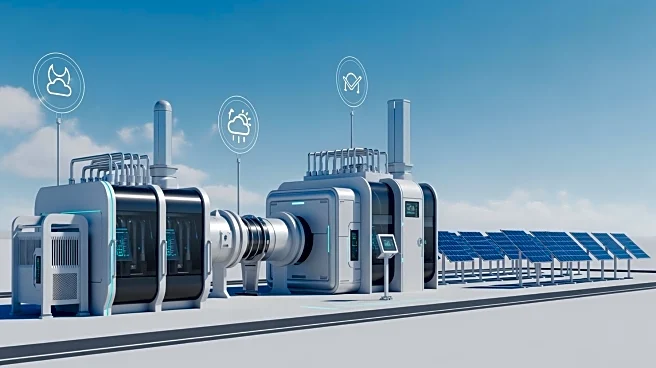What's Happening?
Engineers at the University of Sheffield's Advanced Manufacturing Research Centre (AMRC) have developed a method to incorporate weather forecasts into manufacturing processes to enhance sustainability.
This innovative approach aims to reduce the environmental impact of manufacturing without compromising productivity. The initiative is part of a broader trend in the industry to integrate sustainable practices into traditional manufacturing processes. The AMRC's work highlights the potential for using real-time data to optimize energy consumption and resource use in manufacturing, aligning with global efforts to reduce carbon footprints and promote environmental responsibility.
Why It's Important?
The integration of weather forecasts into manufacturing processes represents a significant advancement in sustainable industrial practices. By optimizing energy use based on weather conditions, manufacturers can potentially reduce their carbon emissions and operational costs. This development is crucial as industries worldwide face increasing pressure to adopt environmentally friendly practices. The approach not only supports sustainability goals but also enhances operational efficiency, offering a competitive advantage to companies that implement such technologies. As industries strive to meet regulatory requirements and consumer demand for greener products, innovations like this could play a pivotal role in shaping the future of manufacturing.
What's Next?
The success of the University of Sheffield's initiative could inspire other research institutions and manufacturing companies to explore similar sustainable practices. As the industry continues to prioritize environmental responsibility, there may be increased investment in research and development of technologies that integrate real-time data into manufacturing processes. Policymakers and industry leaders might also consider creating incentives for companies that adopt such sustainable practices, further accelerating the transition towards greener manufacturing. The broader adoption of these technologies could lead to significant reductions in industrial carbon emissions, contributing to global climate change mitigation efforts.
Beyond the Headlines
This development underscores the growing importance of interdisciplinary approaches in tackling environmental challenges. By combining meteorological data with manufacturing processes, the initiative highlights the potential for cross-sector collaboration in achieving sustainability goals. It also raises questions about the role of technology in transforming traditional industries and the need for continuous innovation to address complex global issues. As industries evolve, the ability to adapt and integrate new technologies will be crucial in maintaining competitiveness and meeting the demands of a rapidly changing world.








